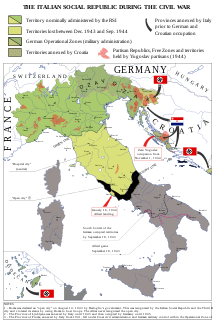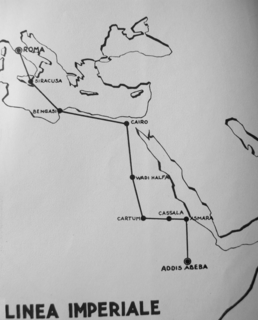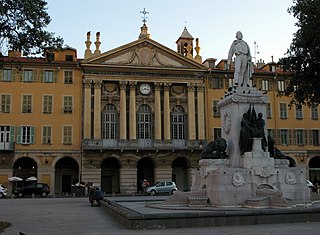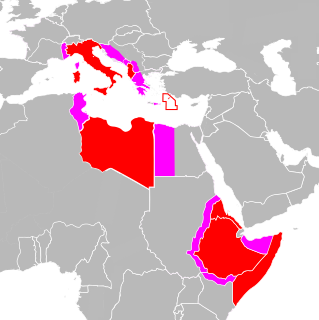 W
WThe Kingdom of Italy was governed by the National Fascist Party from 1922 to 1943 with Benito Mussolini as prime minister. The Italian Fascists imposed authoritarian rule and crushed political and intellectual opposition, while promoting economic modernization, traditional social values and a rapprochement with the Roman Catholic Church. According to Payne (1996), "[the] Fascist government passed through several relatively distinct phases". The first phase (1922–1925) was nominally a continuation of the parliamentary system, albeit with a "legally-organized executive dictatorship". The second phase (1925–1929) was "the construction of the Fascist dictatorship proper". The third phase (1929–1934) was with less activism. The fourth phase (1935–1940) was characterized by an aggressive foreign policy: the Second Italo-Ethiopian War, which was launched from Eritrea and Somaliland; confrontations with the League of Nations, leading to sanctions; growing economic autarky; invasion of Albania; and the signing of the Pact of Steel. The fifth phase (1940–1943) was World War II itself which ended in military defeat, while the sixth and final phase (1943–1945) was the rump Salò Government under German control.
 W
WThe Kingdom of Italy was a state that existed from 1861—when King Victor Emmanuel II of Sardinia was proclaimed King of Italy—until 1946, when civil discontent led an institutional referendum to abandon the monarchy and form the modern Italian Republic. The state was founded as a result of the Risorgimento under the influence of the Savoy-led Kingdom of Sardinia, which can be considered its legal predecessor state.
 W
WTwo of the three Axis powers of World War II—Nazi Germany and their Fascist Italian allies—committed war crimes in the Kingdom of Italy.
 W
WThe black nobility or black aristocracy are Roman aristocratic families who sided with the Papacy under Pope Pius IX after the Savoy family-led army of the Kingdom of Italy entered Rome on 20 September 1870, overthrew the Pope and the Papal States, and took over the Quirinal Palace, and any nobles subsequently ennobled by the Pope prior to the 1929 Lateran Treaty.
 W
WAntonio Garbasso was an Italian physicist and National Fascist Party politician. He was the 14th mayor and the 1st podestà of Florence, Kingdom of Italy.
 W
WThis articles covers the history of Italy as a monarchy and in the World Wars.
 W
WThe Imperial Line was a flight route of the Italian national airline Ala Littoria between 1935 and 1941 during the Fascist era. It was the longest route in the Italian colonial empire in Africa and "the jewel in Ala Littoria's crown". It connected Rome with Benghazi (Libya), Asmara (Eritrea), Addis Abeba (Ethiopia) and Mogadishu (Somalia). It carried passengers and mail. Italy ultimately lost control of the route during World War II.
 W
WThe Italian occupation of Majorca lasted throughout the Spanish Civil War. Italy intervened in the war with the possible intention of annexing the Balearic Islands and Ceuta and creating a client state in Spain. The Italians sought to control the Balearic Islands because of their strategic position, from which they could disrupt lines of communication between France and its North African colonies, and between British Gibraltar and Malta. Italian flags were flown over the island. Italian forces dominated Majorca, with Italians openly manning the airfields at Alcúdia and Palma, as well as Italian warships being based in the harbour of Palma. However some historians -like Gilbeto Oneto and Rosaria Quartararo- expressed a criticism about this supposed Italian plan to annex Majorca.
 W
WLa Disperata was the name given to the group of bodyguards who protected Gabriele D'Annunzio. It was taken up in turn by a number of later squadri and fascist military units in Italy between 1921 and 1945.
 W
WThe Liberal Union, simply and collectively called Liberals, was a political alliance formed in the first years of the 20th century by the Italian Prime Minister and leader of the Historical Left Giovanni Giolitti. The alliance was formed when the Left and the Right merged in a single centrist and liberal coalition which largely dominated the Italian Parliament.
 W
WThe Niçard exodus was one of the first emigration phenomena that involved the Italian populations in the contemporary age. It was due to the refusal of a quarter of the Niçard Italians to stay in Nice after its annexation to France in 1861, which was decided after the Plombières Agreement.
 W
WThe proclamation of the Kingdom of Italy was the formal act that sanctioned the birth of the unified Kingdom of Italy. It happened with a normative act of the Savoyard Kingdom of Sardinia — the law 17 March 1861, n. 4761 — with which Victor Emmanuel II assumed for himself and for his successors the title of King of Italy. March 17 is commemorated annually by the Anniversary of the Unification of Italy, a national holiday established in 1911 on the occasion of the 50th anniversary, and also celebrated, in the Republican era, in 1961 and 2011.
 W
WThe Red Republic of Caulonia was a short lived revolutionary communist Italian state formed on 6 March 1945 by the mayor of Caulonia Pasquale Cavallaro, an elementary teacher and former seminarian who joined the Italian Communist Party in 1943.
 W
WThe Roman Question was a dispute regarding the temporal power of the popes as rulers of a civil territory in the context of the Italian Risorgimento. It ended with the Lateran Pacts between King Victor Emmanuel III of Italy and Pope Pius XI in 1929.
 W
WThis article is about Italian military operations in World War I.
 W
WThe participation of Italy in the Second World War was characterized by a complex framework of ideology, politics, and diplomacy, while its military actions were often heavily influenced by external factors. Italy joined the war as one of the Axis Powers in 1940, as the French Third Republic surrendered, with a plan to concentrate Italian forces on a major offensive against the British Empire in Africa and the Middle East, known as the "parallel war", while expecting the collapse of British forces in the European theatre. The Italians bombed Mandatory Palestine, invaded Egypt and occupied British Somaliland with initial success. However, German and Japanese actions in 1941 led to the entry of the Soviet Union and United States, respectively, into the war, thus ruining the Italian plan of forcing Britain to agree to a negotiated peace settlement.